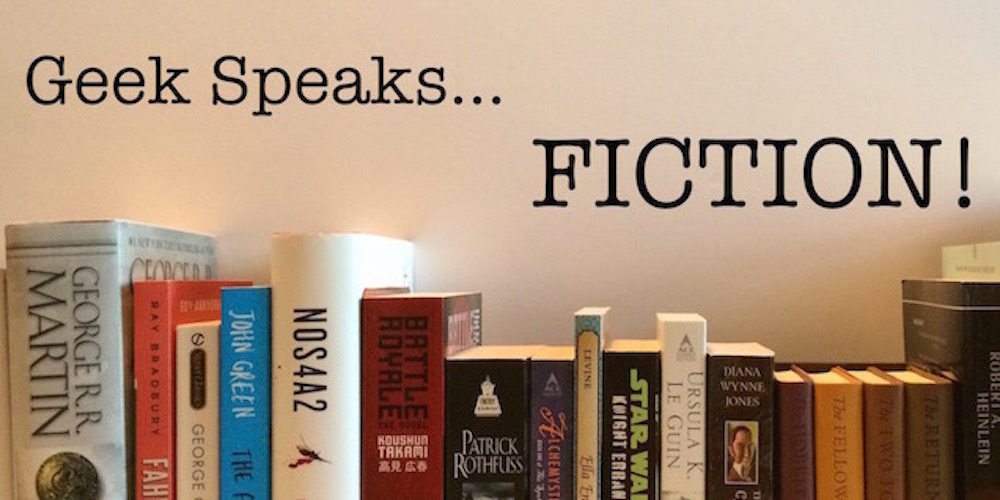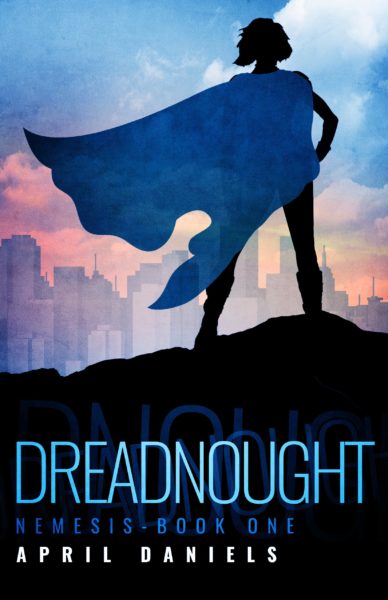
This week we have YA author April Daniels on board! She has an exciting new book, Dreadnought, out from Diversion Books, which is not only an awesome superhero book but also realistically touches on transmisogyny in today’s society. Please welcome April!
Hello! My name is April Daniels, and I wrote a YA superhero book called Dreadnought. It’s a book about being queer and having sh*tty parents and fighting supervillains, and also, waaaaaay in the background where it’s out of the way, the importance of the structures of municipal governance. I’m very excited to have been asked to write this post for GeekMom, because it lets me go into tedious detail about some of the worldbuilding in this book that I am most proud of, but which due to the nature of the story, is mostly hidden in the background, and only suggested through the narration.
When I was sitting down to write the book, I knew I had a few goals in mind for how I wanted the setting to work.
First, I wanted violence and mayhem to be treated as serious threats. City-wrecking superbrawls happen in this world, but they’re relatively rare and treated as major disasters. This is important because, otherwise, the emotional assumptions of the book would be out of tune. You see, violence is a serious threat to the people suffering it, and since surviving emotional abuse is such a big part of this book, then all levels of violence must be treated with the same due respect. Otherwise, the mismatch between the gravity of Danny’s struggles at home and the relatively flippant attitude towards violence we see in something like Guardians of the Galaxy would manifest for the reader as a kind of narrative dysphoria, a mismatch between what they see happen and what they’re being told is happening.
(To be clear: I love Guardians of the Galaxy, but it’s a very different sort of story than the one I’m telling here, and it demands a different set of narrative structures to support it.)

So it follows that in Danielle’s world, major superhero fights are relatively rare because a lot of effort is put into preventing them in the first place. Even smaller fights are life and death struggles where there is little time for snappy remarks and ironic detachment. Many capes go their entire careers without saving the world—saving lives and confronting evil is considered to be a worthwhile calling even at the scale of single individuals, just like in real life.
Second, I didn’t want superheroes to be above the law, or violent enforcers of their own brand of justice. It is an unfortunate truth that much of our superhero iconography can easily be re-purposed in favor of fascist Great Leader myth-making. Frank Miller made an entire career out of this. Mark Millar is making a lot of money agreeing with Frank, but supposedly from the left, adopting a stance in much of his work that anyone who would set themselves up as a hero with powers must inevitably also be a complete a**hole who does not place a high value on human life. (Millar’s big thrust at a genuine hero comes in the form of a terminally ill young boy—you’ve literally got to be a Make-A-Wish Foundation kid to be morally pure enough to be a hero in his world.) And don’t get me started on Garth Ennis, David Goyer, or Zack Snyder, or, or, or. The legions of edgy dudebros who are still—STILL! Thirty years later!—enthralled by Alan Moore’s pondering of the failure modes of superheroes in his influential limited series Watchmen would have us believe that power corrupts… and therefore nobody would put any effort into ameliorating that concern with sound institutional design.
This, frankly, is harder to believe than the idea that a man could fly.
Third, I wanted Danny to live in a city where a major superteam makes its headquarters. That way there would be a ready supply of adult heroes to stand in contrast with her her youthful optimism (and perhaps naivete). It’s also thematically important that she inherit the mantle of The World’s Greatest Hero, but this in and of itself poses some worldbuilding concerns. Why would the world’s greatest cape associate his operations with a single municipal area? And if he’s such hot stuff, why does he need an entire team to back him up to protect just one city? Shouldn’t they be focusing on national or global problems? The answers to these questions pointed in the same direction as the answers to questions raised by the prior two goals.
Fourth, I wanted superheroes to have a defined and settled place within society, to have space to operate within the law and within social norms, but I did not want superheroes to be government employees. Putting all of these concerns together led to a natural conclusion:
Most headlining capes are government contractors with a license to perform “enhanced Samaritan services,” but are not formally part of any government. To keep my narrative options open, I also decided that there are a large number of so-called graycapes who don’t bother getting a license and operate outside the law as vigilantes. There is considerable tension between superheroes who work within the system and those who set themselves outside of it, thus giving me lots of opportunities to show differing opinions about state power within the narrative.
Which, at long last, brings us to the actual structure of superhero governance within New Port City, a kind of fictionalized Seattle that this book takes place in. The heroes of New Port are part of a team called the Legion Pacifica, which itself is on contract with a multi-state special administrative district that covers Oregon, Washington, Idaho, and parts of Montana. However, by statute, the board members of this district must be elected representatives from the various jurisdiction which fund the organization, which in practice means that the New Port city council all but dictates terms to the district. Thus, it is common (but technically incorrect) practice to refer to the city council as the governing body that the Legion reports to.
There are several other superhero administrative districts in the United States, each servicing a different area, and some places like California have unusual local laws which prevent the formation of an organized superhero community altogether. Cities in these areas typically rely on short-term contractors to provide superhero services during times of crisis, or ask for help from Northern Union. The Union, as it is sometimes referred to, is a continent-wide all-stars team that forms during times of national crisis to confront threats that no individual superhero district has the personnel or equipment to deal with. The Legion Pacifica, with Dreadnought at its core and no serious home-turf threats to consider, often provides the bulk of the muscle for Northern Union deployments, with New Port capes showing up all over America and Canada on a semi-regular basis.
(Tired of being treated like a kid brother by the American and Canadian superhero communities, Mexico withdrew its heroes from Northern Union in the 1990s, and joined them with the Latin American cross-national team instead. This put a substantial dent in Union capabilities, which is why Dreadnought and company have been forced to deploy outside their home territory so many times over the past twenty years. The anglophone cape community has yet to admit that they made a serious mistake, but some critics warn that they must heal the rift and soon before another world-threatening crisis erupts.)
And almost NONE of this actually made it into the book! This is all background stuff, barely even mentioned. It’s still “true” as far as the background structure of the story is concerned, but remember the story is told from a first person perspective by a 15-year-old. She doesn’t give a damn about bystander insurance or cross-jurisdictional cooperation initiatives.
But I do. Because I am a turbo-nerd.
And I am so glad I finally got to talk someone’s ear off about it.
April Daniels graduated from UC Santa Cruz with a degree in literature. She completed her first manuscript by scribbling a few sentences at a time between calls while working in the customer support department for a well-known video game console.
She has a number of hobbies, most of which are boring and predictable. As nostalgia for the 1990s comes into its full bloom, she has become ever more convinced that she was born two or three years too late and missed all the good stuff the first time around.
Her debut novel Dreadnought is on sale now.



